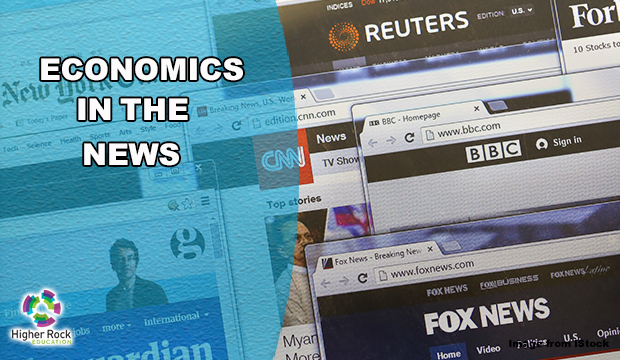
Economics in the News – Nov. 14-20, 2022
Economics impacts our lives every day. Below are some of the top storylines from this past week related to economics.
o Many US consumers and businesses have trimmed spending plans for gifts, charitable donations and holiday plans. High inflation and cost of living are to blame, as around 95 million Americans said they are having difficulty paying for essential household expenses.
According to Deloitte consulting’s annual shopping survey, consumers planned to buy an average of nine gifts this year compared to 16 last year. The average anticipated spending per household is $1,455, a drop of $8 from $1,463 last year. Many households are also planning to cut back on charitable donations. The month between Thanksgiving and Christmas typically accounts for between 20 and 30 percent of charitable donations. [The Wall Street Journal]
o As workers have been persistent in their wishes to work from home or a hybrid work schedule, office buildings in many cities are sitting well below their pre-pandemic levels. With many leases nearing expiration, many businesses are opting for smaller office spaces.
High interest rates are also playing a role, as some landlords are seeking to convert office space into residential complexes. According to a recent study by business professors at Columbia and New York University, the value of U.S. office buildings could plunge 39 percent in the coming years. [The New York Times]
o The Netherlands is a small country, roughly the size of Maryland. But it’s become the world’s second-largest exporter of agriculture products by value behind the United States. The Dutch have produced four million cows, 13 million pigs and 104 million chickens annually and is Europe’s biggest meat exporter. Despite using only a half-gallon of water to grow about a pound of tomatoes, the country provides the most vegetables to Western Europe.
The Netherlands have spearheaded innovations that have reduced water usage and reduced carbon and methane emissions through cell-cultured meat, vertical farming, seed technology and robotics. The Dutch have mastered efficiency. Large companies such as Nestle, Coca-Cola, Unilever and Kraft Heinz all have major research and development centers in the Netherlands. [The Washington Post]
o For the first time, the world’s most popular sporting event is about to go head-to-head with America’s favorite sport. The World Cup, which started Sunday, Nov. 20, in Qatar, is being played in the middle of a busy college football and NFL schedule, creating challenges for broadcasters. It marks the first time the World Cup is being played outside its standard summer window after it was moved to avoid extreme summer temperatures in the host nation, Qatar.
Fox Sports holds the television rights for the World Cup in the United States and is one of the NFL’s lead broadcast partners. The network says that between the World Cup games, the Giants vs. Cowboys Thanksgiving Day game, and the matchup between undefeated University of Michigan and Ohio State University on Saturday, and Sunday’s regular NFL slate, more than 120 million viewers are expected. Fox is charging higher advertising fees than it did in the World Cup four years ago when the United States failed to qualify. A 30-second World Cup ad will cost businesses an average of $300,000, while a 30-second ad during the highly anticipated England vs. United States game on Black Friday sells for an average of $700,000. [Bloomberg]
o Private equity firms and big banks now offer patient financing programs with estimated profit margins exceeding 29 percent. In 2019 most hospitals offered interest-free plans. Hospitals welcome the plans because they are paid sooner. Critics point out that the loans can deepen inequalities because the finance companies charge lower-income patients a higher interest rate if they cannot make larger monthly payments.
Roughly 50 million people are in a financing plan to pay off a medical bill with an estimated 25 percent paying interest on those bills. While financing plans cause issues for families, lenders are profiting and are placing hospitals under increasingly high pressure to charge patients more money. [NPR]